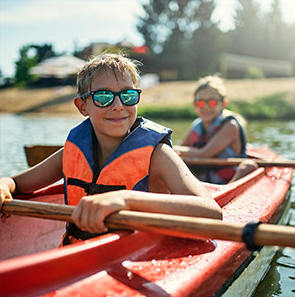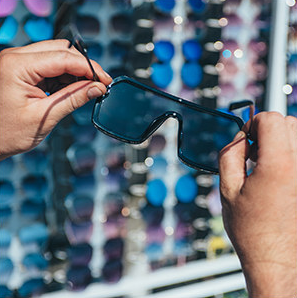Scoping Out Sunglasses: What Kind of Sunglasses Should You Get?

Sunglasses make a fantastic accessory. But there are more reasons to wear your favorite pair than making a statement. Protecting your eye health is the main priority – no matter the season.
How the sun damages your eyes
Spending long hours in the sun without protection increases your exposure to ultraviolet (UV) rays. UV is an invisible form of radiation from sunlight. Overexposure to UVA and UVB radiation causes damage to the skin and eyes.
You can damage the surface of your eyes in the same way you can get sunburned – with just one period of exposure to extremely bright sunlight reflected off of sand, snow, or water. Repeated exposure to sunlight can lead to vision loss from cataracts or macular degeneration.
Other conditions that put your eyes at risk
-

Consistent exposure to surfaces like snow, sand, water, and concrete that reflect UV rays.
- High altitudes or low latitudes. Exposure to UV rays is higher in the mountains or closer to the equator like in the Caribbean, although the UV index can get quite high even in northern Michigan during the summer months.
- Time of day. UV radiation is usually at its highest from 10 am to 4 pm. As a rule of thumb, check your shadow. If it is shorter than you are, UV radiation is at a higher intensity. If it looks longer, UV radiation is at a lower intensity.
- Time of year. UV radiation is higher in the spring and summer and lower in the fall and winter.
How to protect your eyes
Here are the top three ways you can protect your eyes from sun exposure:
- Don’t look directly at the sun.
- Do wear sunglasses that protect your eyes from UVA and UVB rays when you are outside. Wear them even on cloudy days.
- Do wear a hat to provide additional protection for not only your eyes but also your skin. Wear one even on cloudy days.
These precautions are especially important for people who have lighter skin or light-colored eyes and for people who take medicines that increase the skin’s and eyes' sensitivity to sunlight. These medicines can include tetracycline, doxycycline, allopurinol, sulfa medicines, birth control pills, diuretics, phenothiazine, and psoralens.
Choosing the right pair of sunglasses

A higher price does not always mean higher UV protection. As long as the 100% UV label is there, any pair of sunglasses provide effective eye protection regardless of cost.
- Steer clear from buying sunglasses that don’t say how much is blocked. If they don’t block 99% to 100%, don't buy them.
- Darker lenses or polarized lenses do not block more solar radiation. Polarized lenses can reduce the glare coming off reflective surfaces, making activities such as driving or water sports easier and more enjoyable.
- For comfort, sunglasses should be free of distortion and imperfection. Look through the glasses at arm's length and move them slowly across, up, and down over a square pattern like a floor tile. If the lines sway or wiggle, the lenses are imperfect. You also should check lenses to make sure the color is exactly the same throughout.
- If you play sports, consider getting special lenses made from polycarbonate plastic that protects them from breaking. Also, get them with a coating that protects them from scratching.
Questions? Ask a Nurse!
Have questions about eye safety or other health concerns? Talk to a registered nurse by calling Munson Healthcare’s Ask-A-Nurse hotline at 231-935-0951. A registered nurse will address your questions at no cost. Our team of nurses is here for you daily from 7 am – 11 pm.